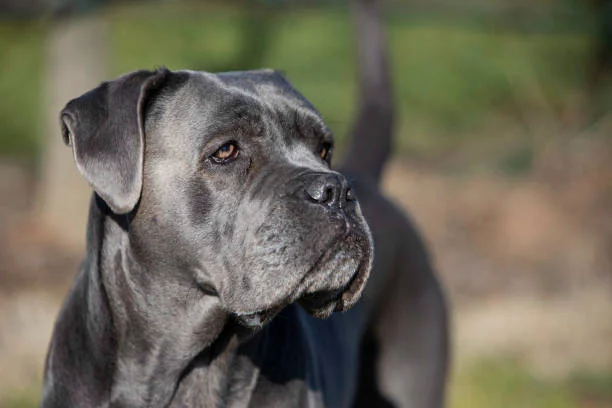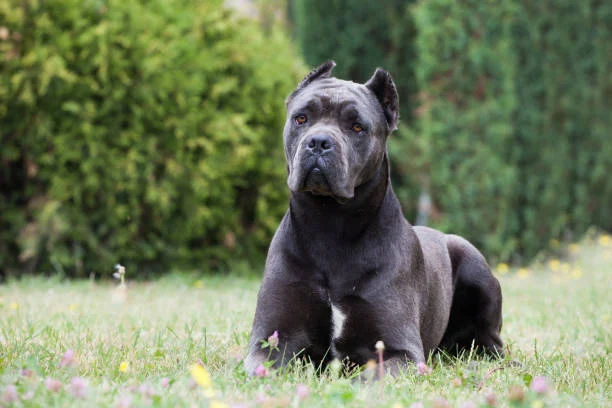The Cane Corso, an imposing Italian mastiff breed, has recently found itself at the center of a growing controversy. With its muscular build and powerful bite, this breed, capable of weighing up to 50kg, is stirring debate over its role in rising dog attacks and whether it should be banned in the UK. So, are cane corso banned in UK?
Despite its recent surge in popularity, particularly as a “status dog” among some high-profile owners, the Cane Corso remains legal to own in the UK, unlike the now-banned XL Bully breed. However, with increasing concerns about its aggression, is it time for stricter regulations or even a ban?
Quick Navigation
The Rise of Cane Corso and Its ‘Status Dog’ Reputation
The Cane Corso, originally bred in Italy to guard livestock and property, is making headlines as it gradually fills the space left by the XL Bully breed. Celebrities like Vin Diesel, Marcus Rashford, and Megan Thee Stallion have been spotted with this large, imposing dog, inadvertently fueling its rise as a “status dog.” However, as its popularity grows, so do concerns about its aggressive tendencies, especially when placed in the wrong hands.
This concern was highlighted in recent dog attacks involving Cane Corsos. In one instance, a Cane Corso attacked a 16-year-old girl in Doncaster, resulting in severe injuries. In another incident, a Cane Corso bit its owner while attempting to break up a fight with an XL Bully. Such events have sparked fears that the breed could become the next target of legislation aimed at reducing dangerous dog attacks.
Are Cane Corso Banned in UK: The Potential Threat
Known for their powerful bite and large frame, Cane Corsos have an inherent strength that makes them capable of causing significant harm when improperly trained or handled. Their bite force is stronger than that of a lion, making them a formidable presence in any setting.
Veterinary professionals like Wendy Cummins, who has euthanized two Cane Corsos due to uncontrollable aggression, warn that the breed’s potential for aggression increases when it is kept in chaotic or poorly trained environments.
Yet, proponents of the breed, such as responsible owners and trainers, argue that when well-trained, Cane Corsos are loving companions and gentle with families. John Allison, a Cane Corso owner, believes that responsible ownership and proper training can prevent the breed from exhibiting aggression. He emphasizes that, like any powerful dog breed, the Cane Corso requires an experienced owner who can manage its strength and ensure proper socialization.
A Growing Number of Dog Attacks
Recent dog attacks involving Cane Corsos have highlighted the breed’s potential danger. In January 2025, a shocking series of dog attacks in South Yorkshire, including one involving a Cane Corso, underscored the growing concern surrounding large dog breeds.
A 16-year-old girl was attacked by a Cane Corso in Doncaster, suffering extensive facial injuries. These incidents are part of a disturbing trend, as data from the NHS and police show a rise in dog attacks across England and Wales.

While the exact number of attacks involving Cane Corsos is not readily available, it is clear that the breed is becoming more prevalent in incidents of dog-related injuries. This increase in aggressive behavior has sparked debates on whether more stringent regulations or even a ban are necessary.
The Dangerous Dogs Act and Its Limitations
Under the Dangerous Dogs Act of 1991, the government banned several breeds, including the American Pit Bull Terrier and the Japanese Tosa. The act was expanded in 2024 to include the XL Bully breed, after numerous attacks and concerns over its aggressive nature. However, this ban has not solved the issue of dangerous dogs. Following the XL Bully ban, many individuals have turned to other large breeds like the Cane Corso, which remains legal to own.
Campaigners and animal welfare groups argue that banning specific breeds like the Cane Corso will not address the root cause of dog aggression. They believe that irresponsible breeding, poor training, and lack of proper socialization are the true causes of aggression in dogs, regardless of breed. Experts like Dr. Samantha Gaines from the RSPCA caution that banning a breed only shifts the problem to another dog type, as seen with the rise of Cane Corsos following the XL Bully ban.
The Case for Responsible Ownership
Instead of breed-specific legislation, many experts advocate for more comprehensive measures to ensure that dog owners are responsible. Licensing dog owners, mandating insurance for all dogs, and requiring mandatory training for large breeds like the Cane Corso could significantly reduce the risk of attacks.
Some also argue that owners should be required to prove they can handle powerful dogs, ensuring that only individuals with the appropriate experience and resources can own a breed like the Cane Corso.
One key issue that has surfaced is the lack of proper training for some Cane Corso owners. Many dogs are kept in chaotic homes, where they are not given the necessary boundaries or socialization. This can lead to fear, anxiety, and ultimately aggression. The key to preventing attacks lies in responsible breeding and ownership, as well as early training and socialization.
Conclusion: Should Cane Corsos Be Banned?
The question of whether Cane Corsos should be banned in the UK is a complex one. While the breed’s power and potential for aggression cannot be ignored, banning the Cane Corso may not be the most effective solution. Instead, addressing the underlying causes of dangerous dog behavior, such as poor training and irresponsible ownership, may be a more effective approach.
As the debate continues, it is clear that the Cane Corso is a breed that requires careful handling. Responsible ownership, proper training, and stricter regulations on large dog breeds are essential in ensuring that these powerful dogs do not pose a risk to public safety.
Until then, the Cane Corso remains a legal breed in the UK, but its future may depend on how the government chooses to address the growing concern over dangerous dogs. Hope so, now you know the anser to: Are cane corso banned in UK?

